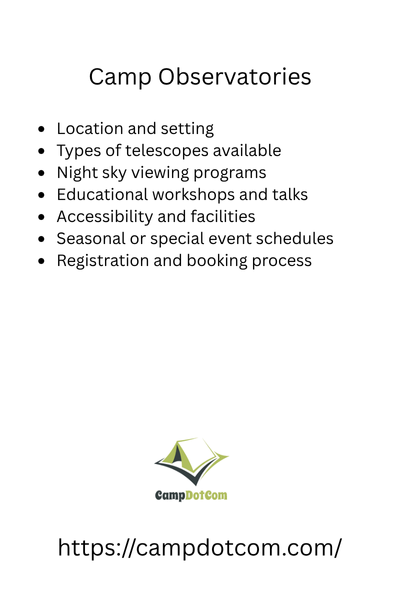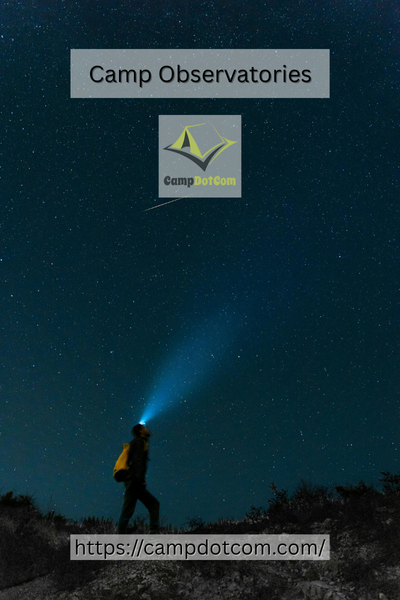Ever thought about ditching your usual weekend plans and heading out to one of those incredible camp observatories? I had not either until I did. And let me tell you, it was nothing short of mind blowing.
Picture this. You are bundled up in a warm hoodie, the kind that still smells faintly like campfire from last fall. You are sipping on a hot mug of something. Coffee, cocoa, maybe a bit of both. Do not judge. And you are surrounded by this huge sky that is absolutely bursting with stars. Not a single city light in sight. Just silence, stars, and space. Literally. That is the kind of magic you get at camp observatories.
Read More About Camp Observatories

So, What are Camp Observatories?
If you’ve never heard of them, you’re not alone. I stumbled across the term while trying to find a weekend escape that didn’t involve long lines or crowded beaches.
As an Amazon Associate, I earn from qualifying purchases. Some of the links in this article are affiliate links. This means that, at zero cost to you, I will earn an affiliate commission if you click through the link and finalize a purchase.
Turns out, camp observatories are exactly what they sound like — remote spots where you can camp and stargaze through professional grade telescopes. Some are run by astronomy clubs, others by state parks or universities, and a few are just good old passionate sky watchers sharing their gear.
You get the peace of camping, the thrill of exploration, and access to skies so dark and crisp you’ll wonder how you ever thought your backyard stargazing was good enough.
More Things to Know About Camp Observatories

Some camp observatories offer guided stargazing, talks, or special events. It’s best to check ahead, especially during busy celestial happenings.
My First Trip to a Camp Observatory
Let me paint you a picture of my first experience. I packed up my old tent (the one with a suspicious rip in the side), grabbed some friends who thought they were coming along for a regular camping trip, and drove four hours out into the middle of nowhere. It was cold. We forgot firewood. And we almost bailed because there was no cell signal—gasp.
But then, just after dinner (a very sketchy freeze-dried lasagna), we walked over to the observatory setup. A volunteer was aligning a telescope bigger than any of us expected, and he let us peek through it. Jupiter, rings of Saturn, the Andromeda galaxy… I’m not exaggerating when I say we were speechless.
Seriously, I don’t remember the last time I saw grown adults giddy like kids on Christmas morning. That was the moment I got hooked.
Why Guys Especially Love Camp Observatories
Okay fellas, let’s be honest—how often do you get to combine cool gear, nature, and science without it turning into a school field trip? Camp observatories hit that sweet spot. Whether you’re a DIY-type who wants to bring your own telescope or just want to chill and soak it all in, there’s something deeply satisfying about seeing a sky full of stars with your own eyes—and knowing exactly what you’re looking at.
And if you’re a fan of gadgets, wait until you see some of the tech at these places. From star trackers to astrophotography setups, it’s like the gearhead’s version of a candy store.
It’s Not Just for the Hardcore Astro Nerds
You don’t need to know a single constellation or difference between a nebula and a star cluster to enjoy camp observatories. That’s the beauty of it. Most spots are super welcoming and love helping newcomers get excited about space.
Honestly, I still can’t pronounce half the stuff I saw—but I can tell you how it made me feel: tiny, amazed, and totally grounded. Which is a weird combo, but if you’ve ever seen the Milky Way stretch across the sky without interruption, you get it.
Tips for Your First Trip to a Camp Observatory
So, thinking about giving it a try? Here’s what worked for me:
- Call ahead or check the observatory’s site. Some require reservations or only open on certain weekends.
- Dress for the cold—even summer nights can get chilly when you’re standing still staring upward.
- Bring snacks. The universe is better viewed with a belly full of trail mix.
- If you have binoculars, bring ‘em! They’re great for casual viewing and spotting satellites or the moon’s craters.
- Don’t be afraid to ask questions. Most regulars are thrilled to help newbies learn the ropes.
Also—don’t forget to put your phone away. Not just because of the light (though that’s a big no-no), but because this experience is best lived unfiltered.
Reflecting on the Wonder of Camp Observatories
Whether you are an amateur astronomer or someone just looking to unplug and unwind, camp observatories offer this incredible mix of peace, awe, and excitement. It is hard to describe the feeling of connecting with the cosmos. Like you are part of something way bigger, but also exactly where you are supposed to be.
And hey, if nothing else, it is the kind of adventure you will talk about for years. Like that time I accidentally called Saturn “Jupiter’s hat” in front of a whole group of space nerds. Yes. That happened.
So next time you are craving something different, skip the usual camping trip and find a camp observatory near you. You might just come back with a new favorite hobby. Or at the very least, a story that involves shooting stars and cosmic surprises.
Ready to look up?
